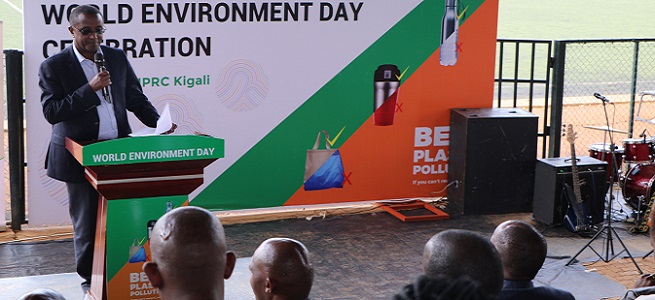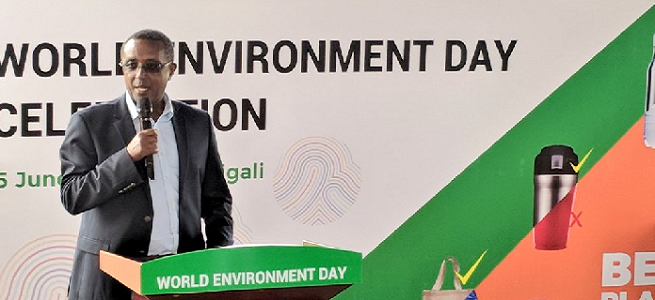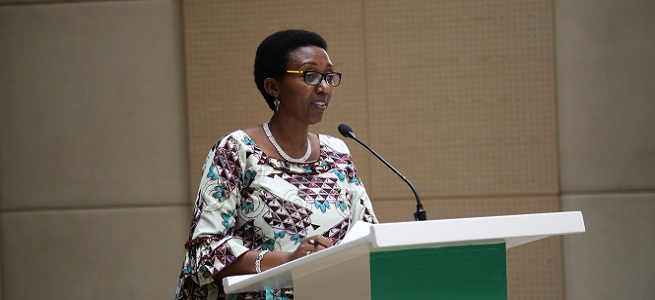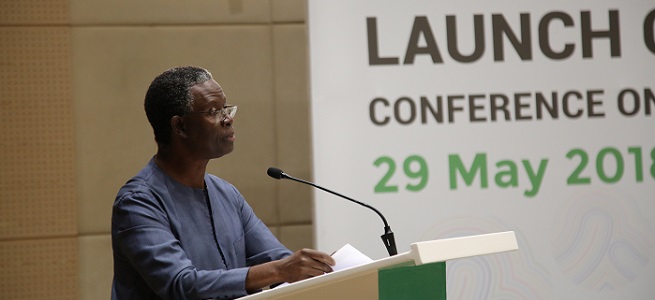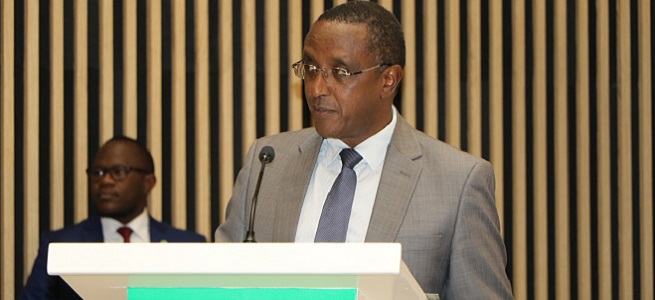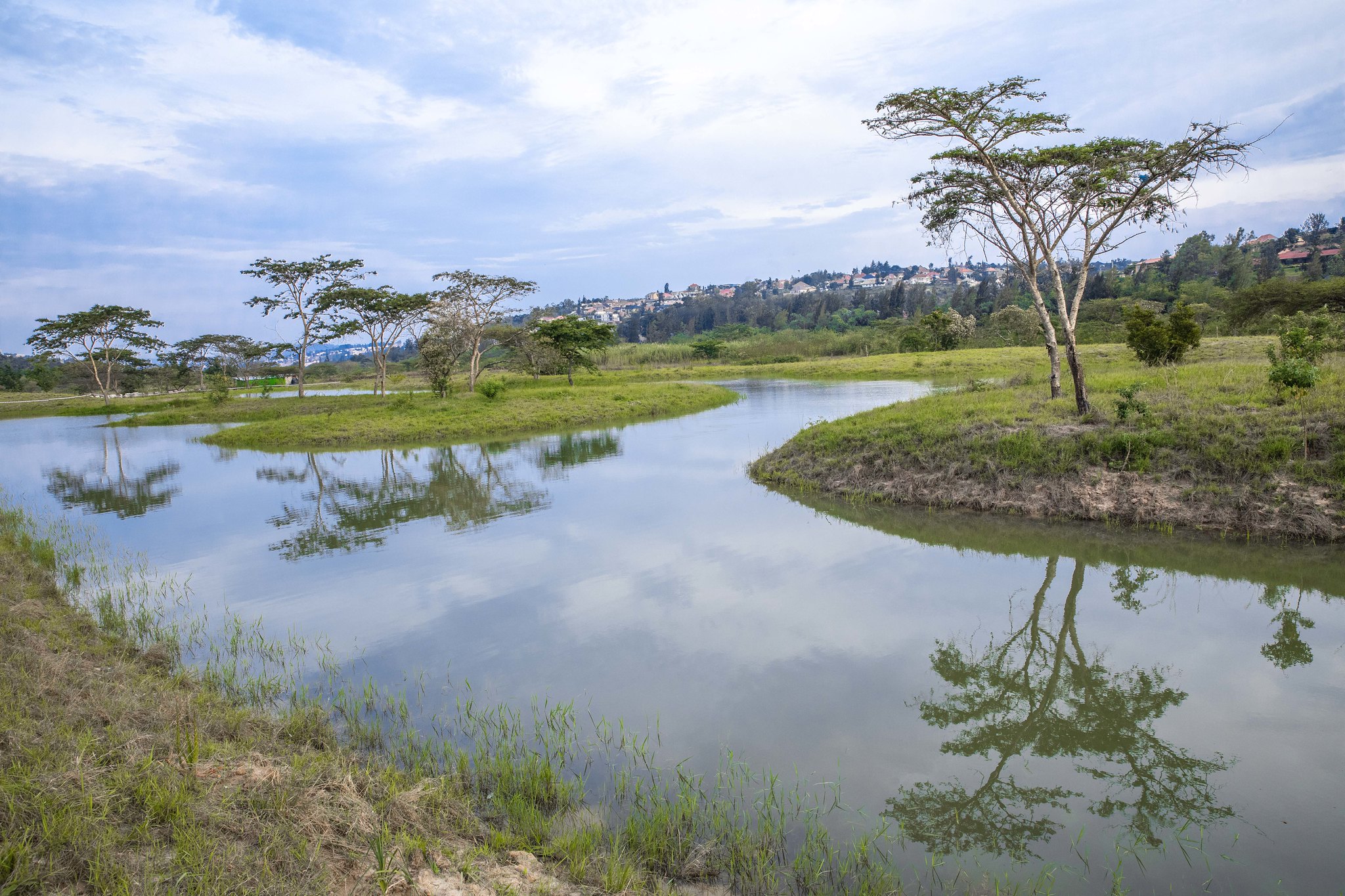
Water users encouraged to be water wise on World Wetlands Day
The Ministry of Environment, Rwanda Environment Management Authority and Rwanda Water Resources Board are encouraging all Rwandans, especially the private sector, to protect and conserve the country’s wetlands to ensure they fulfil their role in flood mitigation, water storage, carbon sequestration, and can provide a habitat for rich biodiversity and space for people to connect with nature. The call comes as Rwanda joins the rest of the world to celebrate World Wetlands Day.
The theme for this year’s World Wetlands Day is Wetlands and Water, drawing attention to the vital role and value of wetlands in sustaining water resources. Not only do wetlands store water, they also filter pollutants leaving fresh water that is safe to drink. Wetlands are valuable ecosystems on which more than one billion people rely for income generating activities and where 40% of the world’s species live and breed.
“Wetlands are source of wealth for all Rwandans. Whether we rely on wetlands for water, recreation or agriculture, we each have a role to play in their protection. Let’s all be water wise users by reporting illegal activities, applying environment friendly fertilisers and pesticides in wetlands and ensuring all commercial users have a valid water permit for the water they extract. Together, we can ensure our wetlands are healthy and full of life” said Dr Jeanne d’Arc Mujawamariya, Minister of Environment.
Rwanda is marking World Wetlands Day with a virtual public discussion on Wetlands and Water.The event brings together experts to share the country’s success in rehabilitating wetlands, water resources management challenges, the role of solutions drawn from nature and how the private sector can contribute to wetland restoration and be responsible water users.
The webinar will also feature a presentation on the Rwanda Urban Development Project II (RUDPII) that is intended to restore urban wetlands in the City of Kigali, such as the former industrial park in Gikondo. The project is part of the Global Environment Facility's Sustainable Cities Impact programme which supports cities pursuing integrated urban planning that delivers global benefits. The project will improve flood control and management in Kigali, protect biodiversity and natural capital through vegetated surfaces and urban wetland management, increase carbon stocks and additional sequestration from restored and rehabilitated wetlands, accelerate Kigali’s vision of becoming a green, sustainable city, and encourage private ecotourism investments.
On World Wetlands Day, private sector water users are requested to apply for water permits to ensure they are in compliance with the law determining the use and management of water resources in Rwanda. Permits can be applied for at www.waterpermit.rwb.rw.
About Rwanda’s Wetlands
Approximately 10.6 per-cent of Rwanda’s surface area is covered with wetlands. The biggest wetlands are floodplain wetlands of low altitude associated with major lakes such as Lake Cyohoha, Rweru, Mugesera, Nasho, and rivers such as Nyabarongo, Akanyaru, Mukungwa, Base, Nyabugogo, among others. In Rwanda, wetlands continue to play an essential role in supporting all development for sustainable development. They provide water storage, flood buffering, nutrient removal, and water purification as well as erosion control.
Despite their importance, wetlands in Rwanda face significant pressures, especially due to poor agricultural practices (uncontrolled fertilisers and pesticides), soil erosion, peat extraction, illegal mining, illegal infrastructure, pollutants from industrial wastewater discharge (organic waste, pathogens and heavy metals) among others.
Wetlands degradation and pollution has significantly impacted water quality and quantity. The declining capacity of wetlands to provide critical ecosystem services has resulted in increased flooding and lives lost, damage to infrastructure, reduced productivity, and silting of water bodies. Climate change and population growth are additional threats to wetlands and freshwater resources.
Rwanda has recorded a number of achievements in wetlands management, including restoration and rehabilitation of degraded wetlands (Rugezi, Nyandungu) and initiation of wetlands rehabilitation projects such as the Rwanda Urban Development Project II (RUDPII), relocation of commercial and household infrastructure from wetlands, development of a wetland masterplan with wise use allocations, inventory, mapping and categorisation of all wetlands and increased enforcement of environmental laws and regulations.
The recently completed Kigali Wetland Master Plan lays the foundation to rehabilitate degraded wetlands within the city. The plan details the areas that need rehabilitation, as well as identifying wetlands with the potential for ecotourism and agriculture activities. The plan is currently being disseminated to relevant stakeholders including government institutions, private investors, and development partners. The next phase of the technical work is to synchronise Wetland Master Plan with the broader City of Kigali Master Plan to harmonise and monitor the wetland management implementation.
Learn more at www.environment.gov.rw, www.rema.gov.rw and www.rwb.rw.
Topics
More posts
Together, We can put an end to single-use plastics
The following was adapted from remarks given by the Minister of Environment, Vincent Biruta, at World Environment Day celebrations in Rwanda on 5 June…
Ijambo rya Ministiri w’Ibidukikije ku Munsi Mpuzamahanga w’Ibidukikije
IPRC Kigali | 5 Kamena 2018
Nyakubahwa Umuyobozi wungirije w’Umujyi wa Kigali ushinzwe ubukungu n'iterambere
Meya w’Akarere ka Kicukiro
…
Refusing single use plastics will make life and the planet better
Rwandans have been encouraged to avoid single-use plastics in order to reduce environmental pollution and save the planet from the dangers of plastic…
Remarks by the Director General of REMA at Launch of the National Environment Week
Hon. Minister of Environment
Hon. Minister of Trade & industries
One UN country Residence Coordinator
CEO PSF
Development Partners
Government…
Remarks by UN Resident Coordinator Dr Fode Ndiaye at Launch of National Environment Week
Nyakubahwa Minister of Environment, Dr. Vincent Biruta,
Honorable Ministers here present,
Senior Government Officials here present,
Honorable…
Remarks by Minister of Environment at Launch of National Environment Week
Fellow Ministers,
One UN Resident Coordinator,
Private Sector Federation Chairperson,
Distinguished guests,
Ladies and gentlemen
Mwaramutse!
It…
